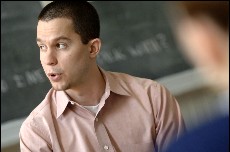Director’s Statement
People always want to know if Steve, Shalisa, Macho, Malikka, Kurtis, and Fresh are “typical” Philadelphia public high school students.
On one hand, they are anything but. They are distinguished by their remarkable perceptiveness, their uncommon candor, and by their unwavering desire to be heard. It is no simple thing to have a camera crew in your bedroom at 6 am on the first day of school or to commit to posterity video diaries of yourself being rejected from college.

- The cast and partial crew of First Person.
- L-R: Steven Parr, Ben Herold, Shalisa Ousley, Mario Amaro, Malikka Saeed, Kate Slovich, Douglas McLean. Not pictured but present in spirit is Kurtis Graves.
On the other hand, however, these six young people exemplify the ‘typical’ urban teens whose lives and stories are so rarely reflected in the popular media. None were academic all-stars, but all were bright and motivated. All six students wanted to go to college, but each struggled to maintain a consistent focus on the future. And although we have come to casually expect urban teens to exhibit a heroic desire to ‘make it out’ of their communities, these six pursued what is in many ways a more elusive goal: finding a way to balance where they wanted to go with where they come from — the families, neighborhoods, and friends that they knew and loved.
In the middle class suburbs I come from, students like these stumble into state schools. Life happens, and we get confused, and we mess up. But when we fall down, it seems there is a large safety net to catch us and a long line of supporters to help get us back on track.
These kids never seemed to have that luxury. When they faced the everyday struggles that urban teens confront all the time, and when they got confused and stumbled, they quickly fell behind. It often seemed impossible for them to find their way back on to the path to college. Their struggles speak to the failure of a system that is more proficient at extinguishing dreams than nurturing them. For me, it was incredibly disheartening to watch as none of the students in First Person made it into a four-year college. I think many viewers will share that reaction as they watch the film.

- Director Benjamin Herold during a First Person planning meeting.
That is why the ways in which this film is used is so important. There is no shortage of documentaries about the teachers, principals, programs, and filmmakers trying to ‘save’ urban public high school students. Too often, these films use the lives of inner city teens as mere backdrops, choosing to instead tell the stories of outside interventions intended to help young people overcome supposed deficiencies in themselves, their families, and their communities.
It should be no surprise, then, that we seem less and less able to connect with real youth in their real life struggles. We too often fail to acknowledge the emotional dynamics or the structural forces at play in their lives, leaving them alone to navigate an escalating series of treacherous decisions. With this film, I wanted to provide a window into how urban public high school students experience the path to college. I wanted them to tell their stories in their own words and to explore this process through their own eyes. If I have done my job well, First Person will help the general public to understand just how rocky the path from urban public high schools on to college is, and it will also help to make that path a little less rocky for a new generation of students just getting ready to pursue their own dreams of college.
Benjamin Herold
Director, First Person
March 2008

